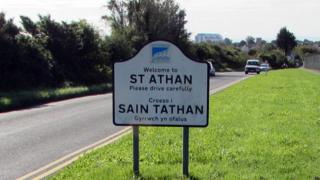Electric cars: St Athan confirmed as site for planned battery factory
 Image copyright Geograph | Jaggery
Image copyright Geograph | Jaggery Plans to build a plant for producing electric car batteries in Wales are a step closer, the firm behind the proposals has said.
Britishvolt had also been considering a Coventry site but said it had signed a memorandum of understanding (MOU) with the Welsh Government to build the factory in St Athan, Vale of Glamorgan.
It said it could create up to 3,500 jobs and lead to £1.2bn of investment.
First Minister Mark Drakeford said the MOU was an «important next step ahead».
He told BBC Radio Wales Breakfast: «It doesn’t mean to say it is in the bag.
«There are important things still to do, including convincing the UK government to provide funding through its automotive transformation fund, but it is an important step on the journey and we are very encouraged by it.»
The agreement is not legally binding but the company told BBC Wales it was now only considering the St Athan site for the project.
Britishvolt’s chief operating officer, Orral Nadjari, who lived in Cardiff for seven years while studying at university, said it was a «very exciting milestone».
«The agreement that we have come to with the Welsh Government is that we’re going to exclusively build our batteries for electric vehicles in Wales.»
Mr Nadjari said the company wants to begin construction in the spring of 2021 with the plant fully operational by the middle of 2023.
Bro Tathan, a former Ministry of Defence site now owned by the Welsh Government, is already home to an Aston Martin electric car plant, which produced its first vehicle last week.
The factory would be a significant boost to Wales’ automotive industry.
Earlier this month Ineos put on hold its plans to build a new 4×4 vehicle plant in Bridgend which would have created 500 jobs.
The Welsh Government said it had invested «significant time and money» and would look to recoup appropriate costs if Ineos pulled out.
Britishvolt’s chief strategic officer Isobel Sheldon said the company was looking to use local workers and materials.
«I think the battery industry has had some bad press over the years because of the embedded carbon in the manufacturing process…so we’re looking at how we can localise that supply chain and shorten those supply lines,» she said.
- Ban on petrol and diesel car sales brought forward
- Petrol and diesel car ban ‘could start in 12 years’
Dr Matthew Davies, associate professor of engineering at Swansea University, said the choice of the St Athan site was a «very significant development for Wales and the UK».
«This industry investment will lead to more jobs and likely will catalyse greater investment into Wales in key areas of renewable and clean energy technologies.
«An additional benefit of making these batteries in Wales is that it reduces our need to import technologies from abroad, saving the associated carbon footprint from shipping, transporting the goods and enhances the sustainability of the batteries.»

Media playback is unsupported on your device
Dr Jean-Paul Skeete, from Cardiff Business School, said the plant would have «knock-on effects» such as potentially attracting more electric car makers to the region.
He said the factory would show Wales was «looking ahead and ready to conduct business, which is key in a post-Brexit, post-pandemic economy».
«Germany and most recently Sweden are by far the most serious contenders regarding lithium-ion battery production in Europe.
A factory in Wales would «puts us squarely in that discussion,» he said.

